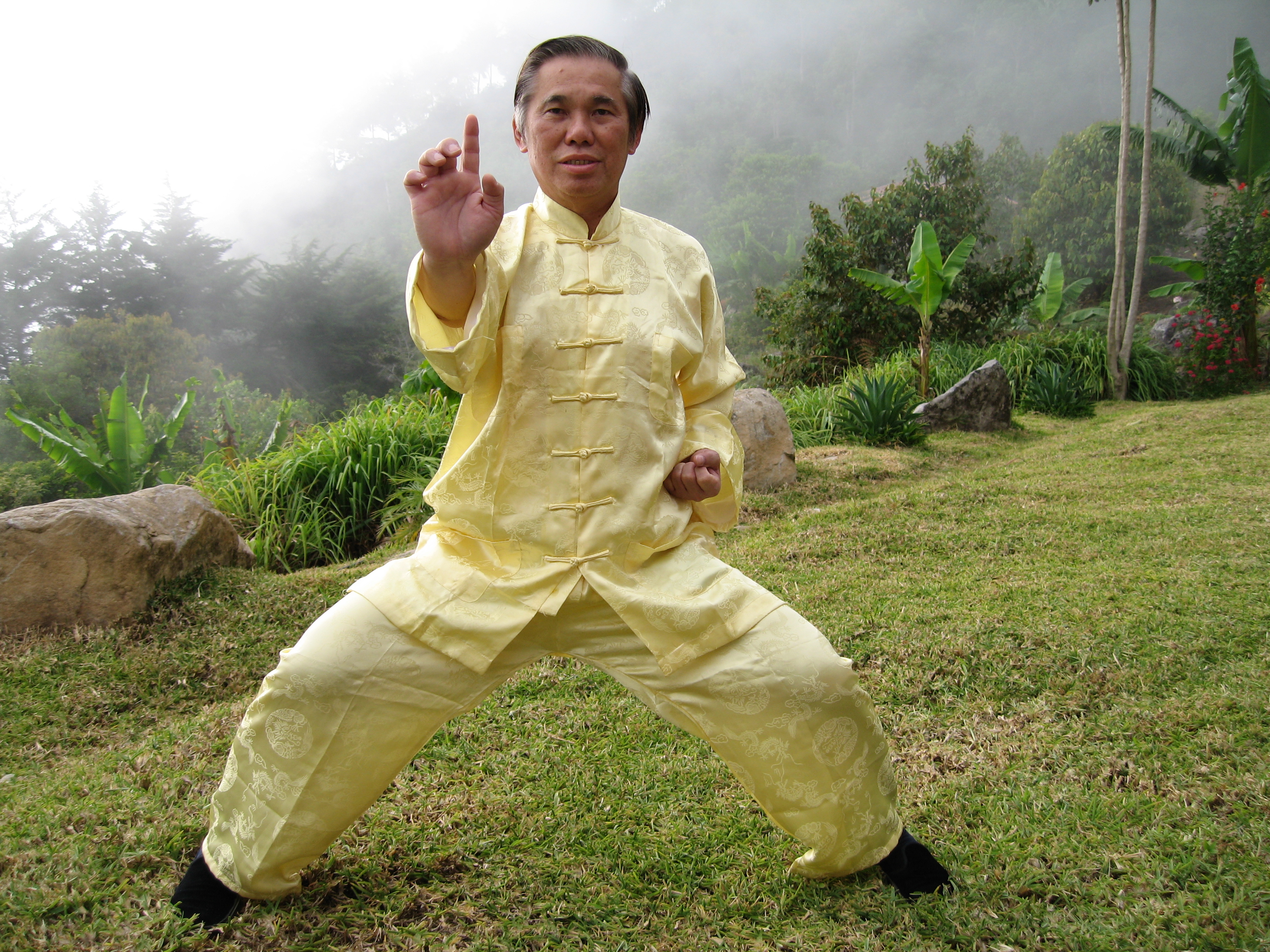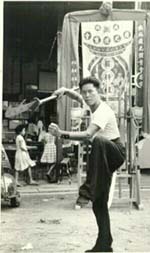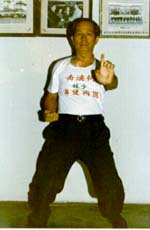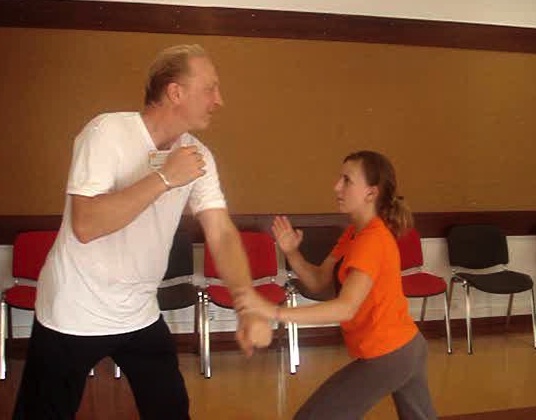SELECTION OF QUESTIONS AND ANSWERS
MARCH 2015 PART 1

One-Finger Shooting Zen
Question 1
Sifu, of the many arts taught in our school, which art you would consider to be the best?
— Sifu Barry Smale, UK
Answer
Needless to say, there are so many wonderful arts in our school that it is not easy to choose the best, and different people will have different choices.
Many students have told me that the best art in our school and anywhere is smiling from the heart. This art, learnt at the start of their career in our school, has changed their life, giving them hope and joy.
Another art that many students consider the best is chi flow. Irrespective of what illness or pain a person may have, chi flow will overcome the illness and pain! Then it gives good health, vitality and longevity.
Entering into a chi kung state of mind, or entering Zen or Tao, is another art many students consider the best in our school. It not only enhances whatever arts they practice, it also enhances whatever they do in their daily life.
These three arts, smiling from the hear, chi flow and entering into a chi kung state of mind, are marvelous. They enrich our life tremendously.
Yet, for me the best art is One-Finger Shooting Zen. My choice is historical and sentimental. It was the first art I learned that opened up a whole new world to me in kungfu, chi kung and Zen.
Despite having practiced kungfu for more than 17 years, my kungfu was still at the form level. One-Finger Shooting Zen changed all this. It gave my kungfu the backing of internal force. It also enhanced my mental clarity, a fact I realized much later.
With internal force, chi kung was no longer gentle physical exercise, and meditation not just sitting in a lotus position. This introduction to the internal art through One-Finger Shooting Zen led to the discovery and appreciation of many other chi kung and kungfu methods.
Question 2
Do you believe people can be influenced by someone else's chi to make them do things they don't want to? Would this be seen as a crime within the school? How would you establish whether or not this is the case?
— Name and Country Withheld
Editorial Note: This is a continuation of questions asked in the previous two issues at February 2015 Part 2 and February 2015 Part 3 of this Question-Answer Series.
Answer
It is not just a belief but a fact that a powerful master can influence someone to do things that he normally would not want to. In our school we consider it a crime, not legally as it is difficult to prove it in a court of law, but morally.
Even leaving aside moral considerations, it would be silly of a master who has this ability to do so, because the evil effects will certainly bounce back to him. The law of karma is a universal truth.
I can ascertain whether I have the skill by performing the skill on someone -- not influencing him to do something he does not want to do, but influencing him to do something that is not harmful to him but he may not normally do, like putting his left hand on his right ear for no apparent reason.
I cannot establish for certain whether another master employs this skill, though I may guess at it.

Sifu Wong's teacher, Uncle Righteousness
Question 3
It is great to have a moral code, but how to measure whether people are following this code, when it is so hard to prove something wrong has happened. Or maybe you are able to see in a way if someone is using his chi wrongly. But then you are prosecutor, judge and executioner at the same time.
Answer
It is not great just to have a moral code, but great to have one and practice it in daily life. This is what we do in Shaolin Wahnam.
It is easy to measure whether people are following the code, and easy to prove something wrong has happened. For example, the first of the Ten Shaolin Laws is to respect the master. When students practice an art according to what and how the master teaches it, and not according to how they think it should be practiced, they are following the first Shaolin Law. If they bad-mouth the master behind his back, something wrong has happened.
Following a moral code is for the good of the students, though many people may not understand or appreciate it.
Many people can see if someone is using his chi wrongly, though these people may not realize it. For example, if a person gets angry easily or ask many unnecessary intellectual questions, he is using his chi wrongly.
When you see someone using his chi wrongly, or when you prevent yourself from using your chi wrongly, you are not being a prosecutor, judge and executioner at the same time as you wrongly suggested. They are totally different issues.
Question 4
In what situation you would find it appropriate to take away someone's title as Sifu? In general and specifically in sexual misconduct?
Answer
There can be a few situations in general as well as in particular.
If an instructor persistently goes against the policies of our school, I shall find it appropriate to take away his title as "sifu".
On the other hand, if taking away his title will contribute to his benefit, like his teaching kungfu or chi kung for our school, will prevent him from promotion in his profession or business, I shall also find it appropriate to take away the title.
In this particular case, if the accused is proven to be a rapist, it will be appropriate to take away his title.

Sifu Wong's teacher, Sifu Ho Fatt Nam
Question 5
Is there anything you have done to stop the accused from doing evil? Or don't you believe he has done anything wrong? Did you try to contact and speak to the victims Anthony said he found?
Answer
Isn't it shocking that as a trained scientist, you can so easily jump into a conclusion without sufficient evidence? Do you have any evidence that he had done evil?
I don't regard accusations as facts. Until the accused is proven guilty, he is deemed innocent. This is clearly Western culture.
Anthony Korahais said he found some victims. He did not provide me with names or any other particulars.
Your attitude shows how influential the bad-mouthing against the accused, and also against me, had been. It is also ironical that presuming an accused guilty before he has been proved, was Eastern culture in the past. But now, happily, even those in Eastern countries would still consider an accused innocent before he has been proven guilty.
Suppose, for fun, someone accused Anthony of sexually abusing some women, which of course is not true. Would you expect me to expel Anthony from our school? Would you call Anthony evil?
But suppose the accused had done evil. Would you be ready to forgive him? Or would you, with statistics showing many convicted criminals continued their crimes when released from prison, join in the fight to bring him to jail at the expense of reviving traumatic pains of victims and ruining family lives of spouses who would otherwise not know the sexual affairs?
Answering these questions does not point to whether you hold Eastern or Western cultures, but show the types of moral values you hold.
Question 6
Are you planning to let the accused back in the school as an instructor in the near or not so near future? What would your reason be and under what condition?
Answer
Frankly, it is none of your business whether I plan to let the accused back in the school as an instructor in the near or not so near future, now or not at all. It is also none of Anthony Korahais' or anybody else's business. It is important for people to know this. Some people think that they have a right to question me or demand an explanation from me, like Anthony Korahais did.
When I didn't give him an explanation, Anthony Korahais resigned from our school. It was his right to resign. It was also their right when other instructors resigned from our school or from being instructors if they were not happy. Personally I preferred them to leave if they did not agree with the policy and philosophy of our school.
But I am not unreasonable. I shall give you an answer because I believe you are sincere in asking the question for your safety, not because you wanted to interfere into how I run our school. It is different from the case of the resigned instructors where their own safety is not an issue.
At present, after discussion with a few senior disciples in our school, I have no plan to let the accused back in our school as an instructor. The main reasons are that the time is not right and many students and some instructors are still uncomfortable with the accusations going on.

In Shaolin Wahnam we treat women as equal to men
Question 7
Did you make a mistake making the accused a "sifu"?
Answer
No, I didn't make a mistake making the accused a sifu. Please don't forget that the accusations against him have never been proven. I regard a person innocent until proven guilty -- a Western moral value I cherish.
He and Rama Roberto were instrumental in spreading Shaolin Wahnam to South America, enabling many people to benefit from our teaching. Although the accused and Rama have resigned from our school, it does not affect my gratitude for their effort.
Question 8
What do you do when your Sifu is wrong?
Answer
As a matter of semantics, I would change the question to "What would you do when your Sifu were wrong?" because in real life I had never found my sifu wrong. It was not due to my being subservient, nor due to my having no mind of my own, but it was a fact, not an opinion.
In the first place, I took great effort to search for the right sifu to learn from. All my sifus were not just patriarchs of their arts, but exemplary in their character. It was really my honour to call them "sifu".
Suppose my sifu were wrong. The first thing I would do was to seriously reassess my judgment. I would seriously ask whether my sifu saw something that I failed to.
If it were a small "wrong", I would overlook it, considering all the "rights" he had shown and taught me. If it were a big "wrong", I would not condone the wrong action, but I would never denounce him. I would still be very grateful to him. I would not act as a hero, attempting to right the wrong. I would leave that to others who were more capable than me.
Irrespective of whether the wrong was big or small, I would remember the universal teaching that "to err is human, to forgive divine".
This aspect of respecting one's sifu is perhaps a notable difference between Eastern and Western cultures. As most of my students are from Western culture, I do not expect them to respect me the way I respected my sifu, though many actually do. But I also do not expect them, being trained in our arts where moral development and spiritual cultivation are essential aspects of our training, to repay kindness with vengeance.
Question 9
How will you protect women in this school from getting assaulted by an/this instructor? And men and women alike from people abusing their power. It seems the school doesn't seem to have a clear protocol for these kinds of events. Would you be interested to develop one?
Answer
The way you ask the questions seems that you presume sexual and power abuse has occurred in our school, which is of course not true. You can be sued for defamation. Asking forthright questions does not mean you can make defamatory remarks or ask defamatory questions.
We don't need you to raise the issue before we develop a protocol to ensure the safety of our students against any abuse. We already have the protocol since long ago. The risk of someone being raped while attending our class is far, far less than when she walks down a street.
If you do not feel safe in any school, you should not learn in it. On the other hand, we do not want students who are doubtful or disrespectful to learn from us. Bear in mind that it does not mean that if you want to learn from us, you will be accepted. You have to prove that you are deserving.
LINKS
Selected Reading
- Showing Respect to the Master
- Glimpses of Sigung's Unbelievable Kungfu
- My Direct Experience of Dim Mak
- The Bear of Five-Animal Play
- Exploding Force in Shaolin Tantui
